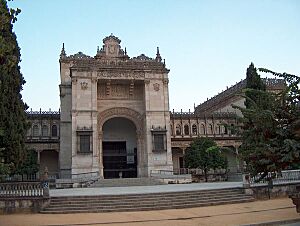Archeological Museum of Seville facts for kids
| Museo Arqueológico de Sevilla | |
 |
|
| Established | 1879 |
|---|---|
| Location | Seville, Spain |
| Type | Archaeology museum |
| Architect | Aníbal González |
| Owner | General State Administration |
The Archeological Museum of Seville (Spanish: Museo Arqueológico de Sevilla) is a cool museum in Seville, a city in southern Spain. It's located inside a beautiful building called the Pabellón del Renacimiento. This building was designed by a famous architect named Aníbal González. The museum is part of the amazing Plaza de España, which was built for a big event called the Ibero-American Exposition of 1929.
Contents
How the Museum Started
When Was the Museum Created?
The idea for this museum began a long time ago. It was officially created by a special royal order on November 21, 1879. This means a king or queen made it happen!
Moving to a New Home
The museum's collection of ancient items moved to its current home, the Pabellón del Renacimiento, starting in 1942. After a few years of setting up, eight exhibition rooms were opened to the public on May 25, 1946.
What Can You See at the Museum?
The Amazing El Carambolo Treasure
In the basement of the museum, you can find the incredible El Carambolo treasure. This treasure was found in a place called Camas, which is about 3 kilometers northwest of Seville, in 1958.
- The treasure is made of 2950 grams of pure 24-carat gold.
- It includes shiny golden bracelets, a golden chain with a pendant, buckles, and special plates for belts and foreheads.
When it was first found, people thought this treasure belonged to an ancient civilization called Tartessos. However, since the 1990s, experts believe it was actually part of a Phoenician holy place. New archaeological digs in the 2000s helped confirm this idea. The treasure even has a small statue of Astarte, who was a Phoenician goddess.
Roman Treasures from Itálica
Other parts of the museum show amazing items from the Roman era. Many of these come from a nearby ancient Roman city called Itálica.
- The Itálica exhibits include beautiful mosaics, which are pictures made from small colored pieces.
- You can also see impressive statues, like the famous Venus of Itálica.
- There are also busts (head and shoulder sculptures) of important Roman emperors like Augustus, Vespasianus, Trajan, and Hadrian.
Another very special sculpture in the museum is the Seated Marriage of Orippo. This unique piece was given to the museum in 1944.
Images for kids
See also
 In Spanish: Museo Arqueológico de Sevilla para niños
In Spanish: Museo Arqueológico de Sevilla para niños
 | Bayard Rustin |
 | Jeannette Carter |
 | Jeremiah A. Brown |



